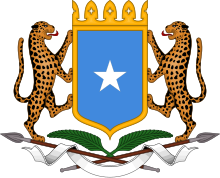Qolobaa Calankeed
| Qolobaa Calankeed (so) | ||
| Louange au drapeau | ||
|---|---|---|
 Armoiries de la Somalie. | ||
| Hymne national de | ||
| Paroles | Abdullahi Qarshe 1959 |
|
| Adopté en | 2012 | |
| modifier |
||
Qolobaa Calankeed (prononcé [qɔlɔbæː ʕælænkeːd] ; signifiant « Louange au drapeau ») est l'hymne national de la Somalie. Il est devenu l'hymne national le , quand la Constitution de la Somalie a été adoptée[1], remplaçant Soomaaliyeey toosoo.
Les paroles ont été écrites par Abdullahi Qarshe en 1959[2],[3].
Paroles[modifier | modifier le code]
Paroles en somali[modifier | modifier le code]
Refrain :
Qolobaa calankeed,
waa ceynoo,
Innaga keenu waa,
Cirkoo kale ee,
Oon caadna lahayn,
Ee caashaqaye.
Xidigyahay cadi,
Waad noo ciidamisee,
Carradaa kaligaa
adow curadee
cadceeda sidee
lo caan noqo ee
Refrain
Deuxième couplet :
Cashadaad dhalataa
caloosheennee
sidii culagii
ciidad marisee
Allow ha ku celin,
"Cawooy!" dhahe ee
Refrain
Version anglaise[modifier | modifier le code]
Refrain :
The flag of any nation
beareth its color,
but the sky,
doth our flag resemble,
and without defects;
love it with candour!
Oh thou White Star,
at thy service we are
Thou art superior,
in any part of our land,
be famous oh Star!
like the sun of the far.
Refrain
On the day thou arosest,
our hearts thou hast
with pureness purified!
oh thou banner,
Lord shan't thee dim,
in this night we pray.
Refrain
The detached part of,
our forces of five.
From Lord I beseech,
their return thou causest
this fate that wrote,
for us now to meet.
Refrain
Traduction française[modifier | modifier le code]
Notes et références[modifier | modifier le code]
- République fédérale de Somalie - Constitution provisoire (), Somalie.
- (en) Central Intelligence Agency, The CIA World Factbook 2017, Skyhorse Publishing, (ISBN 978-1-5107-1289-8, lire en ligne), p. 778.
- (en) B. Turner, The Statesman's Yearbook 2014: The Politics, Cultures and Economies of the World, Springer, (ISBN 978-1-349-59643-0, lire en ligne), p. 1116.
